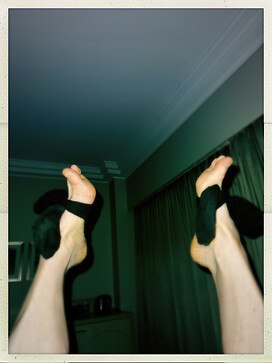Endless Motion and Meaningless Relief: Rant in A MInor
Restless Legs Syndrome. A name so offensively benign it feels like a deliberate act of medical gaslighting. A child fidgeting during assembly, not a neurological torment that turns sleep into a negotiation and rest into a joke.
For those of us who live with it, there is no mistaking its presence. RLS is not pain, not in the conventional sense. It is worse. It is a gnawing discomfort that begins in the marrow and spirals outward. An ache with no epicentre. A compulsion without cause. A demand for movement that offers no satisfaction, only postponement.
Estimates suggest that up to 10% of adults may suffer from some form of RLS. Theories abound: dopaminergic dysfunction, iron deficiency, genetics, peripheral neuropathy. The result of overactive nerves or underwhelming neurotransmitters. But ask any neurologist what definitively causes it and watch their eyes slide away into polite uncertainty. You quickly realise you’ve entered medical purgatory—a limbo of the vaguely understood. The condition is real, and not. Believed, and not. A sort of Schrödinger’s disorder: present and absent all at once.
What makes it intolerable isn’t just the physical sensation (though that is its own slow form of psychological erosion), it’s the unpredictability. The sheer caprice. The not knowing if tonight will be one of those nights. You sit down to a concert, a film, a play, and within minutes a whisper begins somewhere in the legs. Then comes the internal scream. The twitch beneath the skin. And before long, your entire body is conspiring against stillness. You stretch, flex, tense, and shift in the dimming auditorium, all while your neighbour sits blissfully unaware that you are being dismantled by your own nervous system.
But it is in the bedroom that RLS reveals its full cruelty. The world sleeps. You pace. You try to lie still. You fail. Again and again. The restlessness is not soothed by stillness, it’s provoked by it. Lying in bed becomes a form of self-harm. The only thing that works is movement. And even that only works while you’re doing it. The moment you stop, it returns. Walking helps. Temporarily. Rubbing, stretching, pacing—again and again. The bedroom becomes a loop. A corridor of despair, each footfall echoing the futility of relief.
It is, in this way, the perfect metaphor for endurance. For those long nights of sleeplessness where your only companion is the ticking of a clock that does not care. Where the silence becomes accusatory. Where time is not counted in hours but in circuits walked between the kitchen and the living room. When dawn comes, it brings not rest but the humiliating knowledge that you’ve made it through another night and nothing is better. You’re simply more tired.
There are nights where I walk twelve thousand steps between midnight and dawn, all within the perimeter of a two-bedroom house. No music. No podcast. Just footfall and the sound of time stretching itself thin.
I once beat the soles of my feet with two wooden spoons at 3 a.m. out of sheer despair. Didn’t help, but I’ve become a much better drummer.
And still they ask: “Have you tried magnesium?”
You nod absently. Like acknowledging a distant church bell on a foggy hill. They mean well. You have, of course. You’ve tried everything. Magnesium. Iron. Tonic water. Prayer. Dopamine agonists. Anticonvulsants. Opioids. Compression socks. Weighted blankets. Meditation. Abstinence from caffeine, alcohol, and joy. You’ve done downward dog at 2am in your underwear. You’ve rubbed your legs raw, punched them even, cursed the gods, considered amputation… not with fear, but with yearning.
In one moment of quiet, shameful, desperation you’ve even tried the ‘Tik Tok sock around the feet' trick.
Some of it works. Briefly, with all the permanence of mollifying a toddler having a tantrum under a table. Then it doesn’t. One medication worked wonders for two weeks, then brought hallucinations and a compulsion to rearrange my entire book collection by ISBN. Another dulled the legs and the libido in equal measure. The rest simply did nothing, which would have been tolerable had they not done so with such conviction.
This is not a condition you die from. But it is one you live with. And that living is the hardest part. It isolates. It exhausts. It makes you fear your own body. Fear the softness of a mattress. The hush of the bedroom. The idea of a long-haul flight becomes a Kafkaesque nightmare. Even the act of sitting next to a loved one becomes a performance - how long can I stay still without making them aware of what’s happening beneath the surface?
There’s no endpoint. No moment of triumph. No narrative arc of recovery. You don’t beat RLS. You learn to exist within it. To nod politely. To walk in the dark. To master the art of pretending to rest while never resting. And perhaps that’s the most honest description of it: a condition not of pain, but of performance. You look fine. You speak clearly. But inside, every inch of you is moving.
There are worse things, of course. But few so quietly ruinous. There’s something about this – about the absurdity of it, the endurance, the isolation it carves – that makes you want to scream into the softness of a pillow. Or pace. Always back to pacing.
That, at least, never fails. While you’re moving, it stays quiet. While you’re still, it whispers. Always there, somewhere in the legs. A message you can’t quite read, written in invisible ink.

